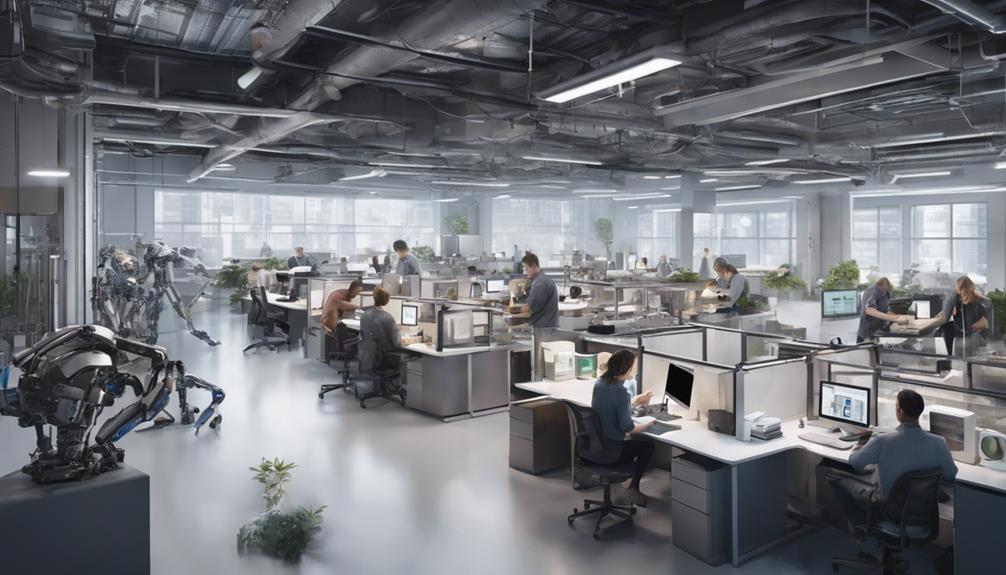As artificial intelligence (AI) advances rapidly, there is a noticeable shift happening in the job market. As AI continues to evolve, it is increasingly important to comprehend its impact on job creation.
The potential of AI to generate employment opportunities is a subject of interest and debate among experts and policymakers alike. Understanding the nuances of this transformative force is crucial for individuals and organizations navigating the evolving job market.
The intersection of AI and job creation is a complex yet intriguing phenomenon that warrants exploration.
Key Takeaways
- AI leads to evolving job roles, requiring higher-level skills.
- New jobs focus on utilizing AI insights, shifting to analytical roles.
- AI professionals contribute to economic growth through innovation.
- Human skills like creativity, problem-solving, and empathy are crucial in the AI era.
Automation and Job Evolution
Through the automation driven by AI, job roles are evolving to require higher-level skills and a focus on interpreting and utilizing AI-generated insights. AI's ability to automate repetitive tasks has led to the creation of new job roles that demand advanced competencies. This shift signifies a move towards strategic roles that necessitate employees to engage with AI systems, extract valuable insights, and make informed decisions based on the generated data.
As AI continues to streamline processes in manufacturing and logistics, workers are transitioning to supervisory positions that involve overseeing automated systems and optimizing their performance. The job evolution spurred by AI involves a transformation from manual labor to roles that emphasize analytical thinking and decision-making capabilities. Consequently, there is a growing need for upskilling to meet the demands of these new job requirements brought about by the integration of AI across various industries.
Embracing this evolution is crucial for individuals and organizations looking to thrive in an AI-driven future.
New Roles in AI Field

The burgeoning field of AI is witnessing a surge in demand for specialized roles such as machine learning engineers, data scientists, AI ethics specialists, cybersecurity experts, and research professionals, reflecting the evolving landscape of job opportunities driven by advancements in artificial intelligence technologies.
As AI systems become more prevalent across various industries, the need for professionals who can design, implement, and maintain these systems is growing rapidly. Machine learning engineers and data scientists are at the forefront, developing algorithms and analyzing vast amounts of data to train AI models effectively.
Simultaneously, the rise of AI ethics has brought about the necessity for specialists who can ensure the responsible and ethical use of AI technologies. Cybersecurity experts play a crucial role in safeguarding AI systems from potential threats and vulnerabilities, highlighting the importance of securing these advanced technologies.
The job market is expanding to accommodate these new roles, offering exciting opportunities for professionals to contribute to the economic growth driven by AI innovation.
Impact on Traditional Sectors
Redefining long-established industries, AI is propelling a transformation in traditional sectors through process optimization and the emergence of novel job roles. The impact of AI on traditional sectors like healthcare and agriculture is profound, leading to enhanced efficiency and job creation in specialized fields.
Here are four key ways AI is influencing traditional sectors:
- Healthcare Advancements: AI is revolutionizing healthcare by improving medical diagnosis and drug discovery processes. This transformation not only enhances patient care but also creates new job opportunities in specialized medical fields.
- Agricultural Innovations: In agriculture, AI plays a crucial role in predicting weather patterns and optimizing crop management practices. This leads to the emergence of roles such as agrotechnologists, who leverage AI to revolutionize farming techniques.
- Operational Efficiency: Traditional sectors are experiencing increased operational efficiency through AI integration. By automating tasks and streamlining processes, AI is driving productivity and job growth in various specialized areas.
- Service Expansion: The integration of AI in traditional sectors is expanding service capabilities, leading to the creation of new roles that require expertise in AI technologies. This shift not only improves service quality but also opens up diverse job opportunities in evolving industries.
Entrepreneurial Opportunities

AI-based tools are empowering entrepreneurs to develop innovative solutions and launch businesses with global reach, revolutionizing the entrepreneurial landscape. Small-business owners are benefiting from AI-powered e-commerce platforms that provide access to a broader market and increased sales opportunities. These tools allow entrepreneurial ventures to create customized solutions, meeting specific customer needs effectively.
Moreover, AI is creating non-traditional job opportunities as individuals harness technology for entrepreneurship, leading to the emergence of unique products and services in various industries. The ability to leverage AI for tasks like market analysis, customer segmentation, and personalized marketing strategies enables entrepreneurs to compete more effectively in the market.
As AI continues to advance, entrepreneurial opportunities will expand, driving further innovation and economic growth. Entrepreneurs who embrace AI early on will likely gain a competitive edge and establish themselves as leaders in their respective industries, shaping the future of business with cutting-edge solutions.
Essential Human Skills
Given the rapid evolution of artificial intelligence technologies, the significance of essential human skills in the workforce is increasingly underscored. In the age of AI, human skills such as creativity, problem-solving, empathy, and customer relations play a pivotal role in driving business success.
Here are four essential human skills that are indispensable in a world where AI is prevalent:
- Creativity: Humans possess the ability to think innovatively, come up with original ideas, and envision new possibilities, qualities that AI struggles to replicate effectively.
- Problem-solving: Human intuition and critical thinking skills are essential in navigating complex problems and finding unique solutions that machines may not identify.
- Empathy: Understanding and connecting with others on an emotional level is a distinctly human trait crucial in roles requiring compassion, such as healthcare and counseling.
- Customer Relations: Providing personalized service and building strong relationships with customers are areas where human interaction remains irreplaceable despite AI advancements.
These human-centric skills complement technology and are vital for organizations aiming to thrive in a technologically driven future.
Frequently Asked Questions
How AI Can Generate Jobs?
AI will generate jobs through increased automation, leading to new roles in AI development, maintenance, and oversight. Industries will require skilled professionals to manage AI systems, creating employment opportunities and driving economic growth.
Is It Possible for AI to Replace Jobs?
AI's potential to replace jobs is real, particularly in routine and repetitive tasks. However, roles demanding creativity, empathy, and complex problem-solving are less susceptible. The shift will likely transform rather than completely replace the majority of jobs.
How Many Jobs AI Will Create?
The integration of AI is expected to create approximately 97 million new jobs globally by 2025. AI's expansion across sectors propels the need for a burgeoning maintenance workforce. Its role in fostering job growth, innovation, and efficiency underpins its significant contribution to job creation.
Do You Think AI Technology Will Create More Jobs or Eliminate More Jobs?
AI technology is expected to create more jobs than it eliminates due to its role in enhancing performance, fostering innovation, and driving economic growth. The integration of AI across industries leads to the emergence of diverse job roles, expanding employment opportunities.
Conclusion
In conclusion, the integration of artificial intelligence is set to revolutionize the job market, creating new opportunities and reshaping traditional roles.
As automation continues to streamline processes, individuals and organizations must adapt and upskill to harness the potential of AI for career advancement.
By embracing technological advancements and honing essential human skills, the workforce can thrive in the evolving landscape of job creation and innovation.
Like a beacon of progress in the sea of change, AI offers a promising future for job growth and development.
Ava combines her extensive experience in the press industry with a profound understanding of artificial intelligence to deliver news stories that are not only timely but also deeply informed by the technological undercurrents shaping our world. Her keen eye for the societal impacts of AI innovations enables Press Report to provide nuanced coverage of technology-related developments, highlighting their broader implications for readers.










